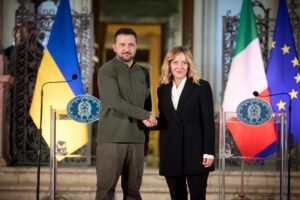
Italy intends to sign an intergovernmental agreement with Ukraine for EUR 50 million to purchase Italian goods and services for recovery and allocate EUR 100 million to the ERA (Economic Resilience Action) of the International Finance Corporation (IFC) of the World Bank Group to support the private sector, Italian Finance Minister Giancarlo Giorgetti said.
“I would like to emphasize that all these initiatives will be financed from new grant resources, with the clear intention of not placing an additional burden on Ukraine’s state budget,” he said at the URC2025 Ukraine Recovery Conference in Rome, according to a correspondent from the Interfax-Ukraine news agency.
The minister also announced an additional contribution of EUR 10 million for the implementation of an EBRD project in the agro-industrial sector, which aims to modernize Ukraine’s agro-industrial sector while promoting its integration into global value chains.
In addition, Giorgetti stressed the importance of technical cooperation as a basis for effective and sustainable reconstruction and announced his intention to allocate EUR 1.5 million to the European Bank for Reconstruction and Development (EBRD) initiative FIRST (Ukraine Facility for Infrastructure Reconstruction) to assist in the preparation of public investment projects for the reconstruction of infrastructure facilities in Ukraine.

Deputy Prime Minister for Recovery, Minister of Community and Territorial Development Oleksiy Kuleba and Deputy Prime Minister, Minister of Foreign Affairs of Italy Antonio Tajani signed a grant agreement for EUR6 million in non-repayable aid for the reconstruction of two irrigation systems in the Odesa region,
according to the press service of the Ministry of Community and Territorial Development.
“This decision will improve the efficiency of agricultural production in southern Ukraine, stabilize water supply, and reduce resource losses in arid areas,” said Deputy Prime Minister for Recovery and Minister of Community and Territorial Development Oleksiy Kuleba.
The ministry added that the ministers signed a number of other agreements on financing key areas of recovery: agricultural infrastructure, cultural heritage sites, medical facilities, housing programs, and ensuring Ukraine’s access to Italian financial mechanisms.

The Ministers of Foreign Affairs of Ukraine and Italy, Andriy Sybiga and Antonio Tajani, signed a Declaration of Intent within the framework of the Tallinn Mechanism on the sidelines of the URC2025 Ukraine Recovery Conference in Rome, the press service of the Ministry of Foreign Affairs of Ukraine reports.
“The document confirms Italy’s continued support in strengthening Ukraine’s civilian cyber resilience and in facilitating the post-war recovery of our country. It also stipulates the intentions of the parties to deepen cooperation in the field of cybersecurity, digital transformation and the implementation of long-term initiatives and projects under the Tallinn Mechanism,” the telegram channel said.
It is noted that for this purpose, Italy has declared the allocation of 1 million euros to finance relevant projects.

Italy is interested in investing in Ukraine and is ready to invest resources without delay, sign agreements, and provide financial guarantee instruments for companies that plan to invest in Ukraine’s reconstruction measures, Italian Prime Minister Giorgia Meloni says.
“Italy, as a country, is also ready to contribute and start now and rebuild what was destroyed – roads, bridges, hospitals, all these buildings,” Meloni said at the Ukraine Recovery Conference (URC2025) during a joint statement with Ukrainian President Volodymyr Zelensky to reporters in Rome on Thursday.
She noted that Italy has already taken Odessa under its patronage to restore cultural and heritage objects. “And we want to even go further, we want to expand our contribution: this is energy, critical infrastructure, transportation, agriculture, also health care. Of course, I won’t list all the initiatives now, but I want to remind you that we are doing a lot of things that are symbolic in terms of humanitarian aid,” the head of the Italian government said.
Meloni also noted that Italy will help in the heroic resistance to Ukraine. “We have done it in different senses and we will also do it on industry and also defense sector and cooperation. We have also talked about this, and this is evidenced by a number of agreements signed today, this is a central theme. And, of course, we will continue our investments, because we understand how important it is to do everything possible so that Ukraine can fight, fight back, defend itself,” she said.
According to the Italian Prime Minister, peace in Ukraine should be “long, lasting, just”, in particular through deterrence.

Support is lowest in France, Spain and Poland, while 21% back authoritarian rule under certain circumstances
Only half of young people in France and Spain believe that democracy is the best form of government, with support even lower among their Polish counterparts, a study has found.
A majority from Europe’s generation Z – 57% – prefer democracy to any other form of government. Rates of support varied significantly, however, reaching just 48% in Poland and only about 51-52% in Spain and France, with Germany highest at 71%.
More than one in five – 21% – would favour authoritarian rule under certain, unspecified circumstances. This was highest in Italy at 24% and lowest in Germany with 15%. In France, Spain and Poland the figure was 23%.
Nearly one in 10 across the nations said they did not care whether their government was democratic or not, while another 14% did not know or did not answer.
Thorsten Faas, a political scientist at Berlin’s Free University, who worked on the study, said: “Among people who see themselves as politically to the right of centre and feel economically disadvantaged, their support of democracy sinks to just one in three.
“Democracy is under pressure, from within and without.”
The study was carried out in April and May. More than 6,700 people between the ages of 16 and 26 in Britain, Germany, France, Spain, Italy, Greece and Poland responded to the ninth annual survey by the YouGov institute for the Tui Foundation, which funds projects dedicated to youth in Europe.
Forty-eight per cent worry that the democratic system in their own country is endangered, including 61% in Germany, where the economy – Europe’s biggest – is ailing and the far right has made significant inroads, fuelled in part by increased backing from young voters.
The return of Donald Trump to the White House, the rise of China, and Russia’s full-scale invasion of Ukraine have shifted power away from Europe in the respondents’ perception, with just 42% counting the EU among the top three global players.
Despite – or perhaps because of – Brexit, the figure was highest among Britons at 50%. Of those surveyed in the UK, 73% wanted a return to the EU, while nearly half of young Europeans (47%) sought stronger ties between the EU and Britain.
The US was seen by 83% as part of the power trio, followed by China with 75% and Russia on 57%.
Rising polarisation is also driving young Europeans to the ideological fringes along with their elders, but a notable gender divide has emerged in the process.
Nearly one in five – 19% – described themselves as politically right of centre, up from 14% in 2021, while 33% called themselves centrists, 32% as leftist and 16% without any designation.
Women in Germany, France and Italy identified as progressive in higher numbers than four years ago, while young men in Poland and Greece have grown more conservative in the same period.
Support for tougher restrictions on migration has grown across the board since 2021, to 38% from 26%.
Most young Europeans expressed hope in the EU’s potential, and two in three overwhelmingly supported their country remaining in the bloc if it still was. But 39% described the EU as not particularly democratic and just 6% said their own national governments worked well, with little need for significant changes.
More than half – 53% – felt the EU was too focused on details and trivial matters. They would like the bloc to tackle the high cost of living, bolster defence against external threats and create better conditions for companies to improve the economy.
Elke Hlawatschek, the head of the Tui Foundation, said: “The European project, which has brought us peace, freedom of movement and economic progress for decades, is seen as unwieldy.”
Greek people see the strongest need for fundamental overhaul of their political system and are most sceptical about the EU, which Faas described as rooted in enduring trauma of the eurozone debt crisis that drove their country’s economy to the brink.
Despite stronger support for climate protection among young Europeans, just one in three said it should take priority over economic growth. The figure has slipped from 44% in 2021.
BREXIT, EUROPE, EUROPEAN UNION, FRANCE, GERMANY, ITALY, NEWS, Young people

Italy is one of the most attractive countries in Europe for buying real estate. Its favorable climate, rich history, developed infrastructure, and high standard of living attract both investors and those looking for a second home on the coast or in a picturesque village. But before buying, it is important to understand the tax system: in Italy, property taxes depend on many factors, from the location of the property to the status of the owner.
Main property taxes in Italy
The Italian tax system for real estate includes both one-time taxes on purchase and annual taxes on ownership.
IMU (Imposta Municipale Unica) — municipal property tax
The IMU rate is set by local authorities and ranges from 0.46% to 1.06% of the cadastral value of the property.
The basis for calculation is the cadastral value (rendita catastale) multiplied by an adjustment coefficient (usually 160 or 168), after which the rate is applied.
When buying from a private individual:
2% of the cadastral value — if it is the primary residence for a resident buyer.
9% — if it is a secondary or investment property.
When buying from a developer:
10% VAT, plus fixed registration fees (€200 each).
Cadastral and mortgage fees are also payable — €50 each.
Special features for non-residents
Foreigners are free to buy real estate in Italy. However, there are several important nuances:
If you are not registered as a resident, IMU tax is levied even on a single property.
Property status is determined not by citizenship, but by registration with the municipality (residenza anagrafica).
If the property is rented out, the rental income is subject to mandatory declaration and taxation:
under the simplified cedolare secca scheme — 21%,
or at a progressive income tax rate: from 23% to 43%.
Calculation examples
An apartment in Rome purchased by a German citizen for vacation purposes:
Cadastral value: €80,000
IMU at a rate of 1%: approximately €1,280 per year
House in Tuscany, rented out:
IMU + TARI: from €1,500 to €2,000 per year
Plus tax on rental income: 21% or according to the scale.
Conclusion
The Italian tax system for real estate requires attention and calculations. The main annual expenses are IMU and TARI, and when purchasing, there are significant one-time fees. In the case of rental or resale, there are additional taxes on income. Therefore, before signing a contract, it is recommended to consult with an Italian lawyer or accountant to avoid surprises and fines.
Source: http://relocation.com.ua/property-taxes-in-italy-analysis-by-relocation/